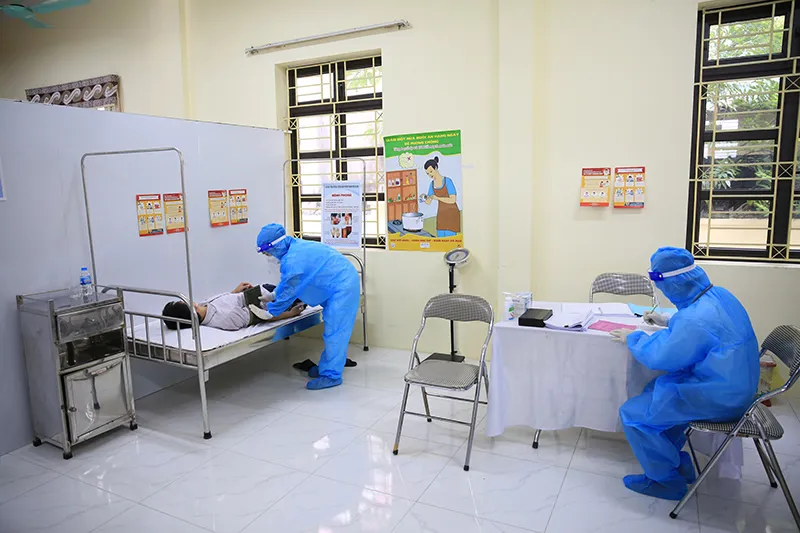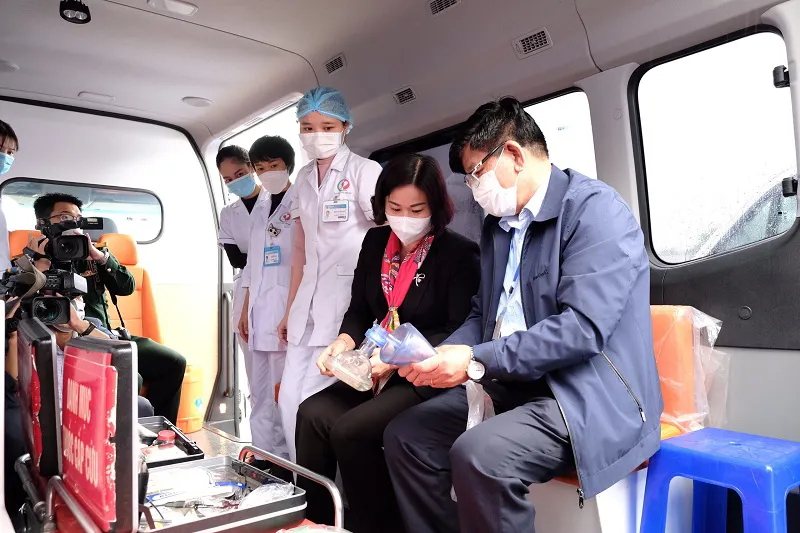Hanoi to set up more than 500 makeshift medical stations
Makeshift medical stations provide primary health care for people in the area while giving treatment to people infected with the Covid-19 virus in the community and family.
Hanoi has made a plan to set up 508 makeshift medical stations in densely populated areas, industrial parks, and export processing zones, according to Deputy Director of the Hanoi Department of Health Tran Van Chung.
The move aims to give health care services to Covid-19 patients, contributing to easing overload in concentrated treatment facilities and hospitals, Chung said, adding that Hanoi’s districts in recent days have started setting up makeshift medical stations and held drills on Covid-19 response in anticipation of a pandemic outbreak.
“The rehearsals took place successfully, showing Hanoi’s preparedness for emergencies,” the deputy director said.
Health workers at a mobile medical station in Yen Xa Village, Tan Trieu Commune, Thanh Tri District of Hanoi carry out examinations for local residents. Photo: Pham Hung/The Hanoi Times |
Makeshift medical stations will be located at gymnasiums, communal houses, office buildings of the local people's committees, private clinics, and so on and will operate 24/7. Each makeshift station needs to have at least five separate rooms to admit some 100 Covid-19 patients.
In accordance with the guidance of the Ministry of Health, makeshift medical stations provide primary health care for people in the area while giving treatment to people infected with the Covid-19 virus in the community and families.
Besides providing routine medical examinations and treatment for local people, makeshift medical stations will monitor Covid-19 cases at their homes, give treatment for Covid-19 patients, and carry out rapid coronavirus testing, vaccination, and communication work.
“A makeshift medical station should have at least one to two doctors and five to seven medical workers in addition to local volunteers who know the area and its population well. It is equipped with at least two oxygen tanks with masks and other emergency devices and medicines. The station has minimal conditions and uses minimal human resources but must ensure the care and treatment of common diseases and cure Covid-19 patients in the community,” Chung told The Hanoi Times.
He noted that medical workers at the station will provide health care consultations to patients via telephone and visit them at their homes while using “Khai bao y te dien tu" (electronic health declaration) app for patient management.
The makeshift health station will have separate cabinets for Covid-19 patients and patients suffering other illnesses.
Standing Deputy Secretary of the Hanoi Party Committee Nguyen Thi Tuyen inspects a makeshift medical station at Thang Long Industrial Park in Hanoi's outskirt district of Dong Anh. Photo: Pham Hung/The Hanoi Times |
Earlier, on August 19, Vietnam’s health ministry asked Ho Chi Minh City and other Covid-hit southern localities to promptly set up makeshift medical stations, which are expected to help people to access uninterrupted medical services.
Hanoi to live safely with Covid-19
Tran Dac Phu, a senior advisor at the Public Health Emergency Operations Center, told The Hanoi Times that the capital city’s pandemic prevention measures during the four periods of social distancing were correct and the capital city has succeeded in controlling the disease.
Specifically, the city has a very effective system to track and trace infections and outbreaks as well as the efficient operation of the grassroots health workers, community-based Covid-19 prevention teams and checkpoints, and especially the awareness and unity of local residents in abiding by the city's pandemic prevention and control measures.
Hanoi has also issued specific directives to combat the pandemic effectively and successfully organized a vaccination campaign for the entire population, to then adapt to Covid-19 in a safe, flexible and effective way.
"I think makeshift medical stations are one among the solutions Hanoi should take. Besides, the capital city needs to apply information technology more aggressively in pandemic prevention and control," Phu said.












